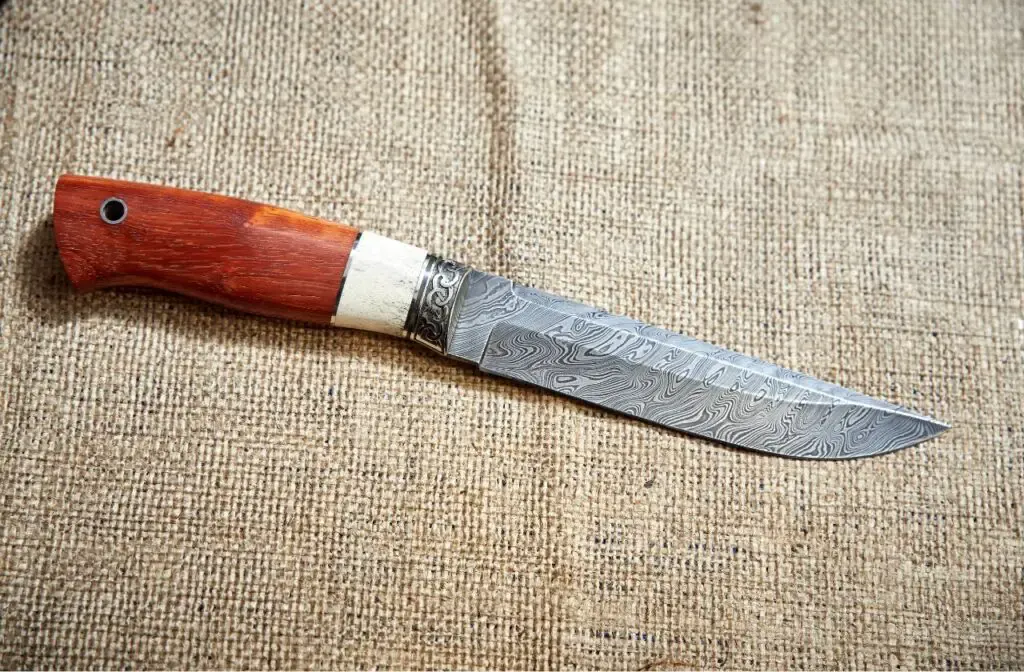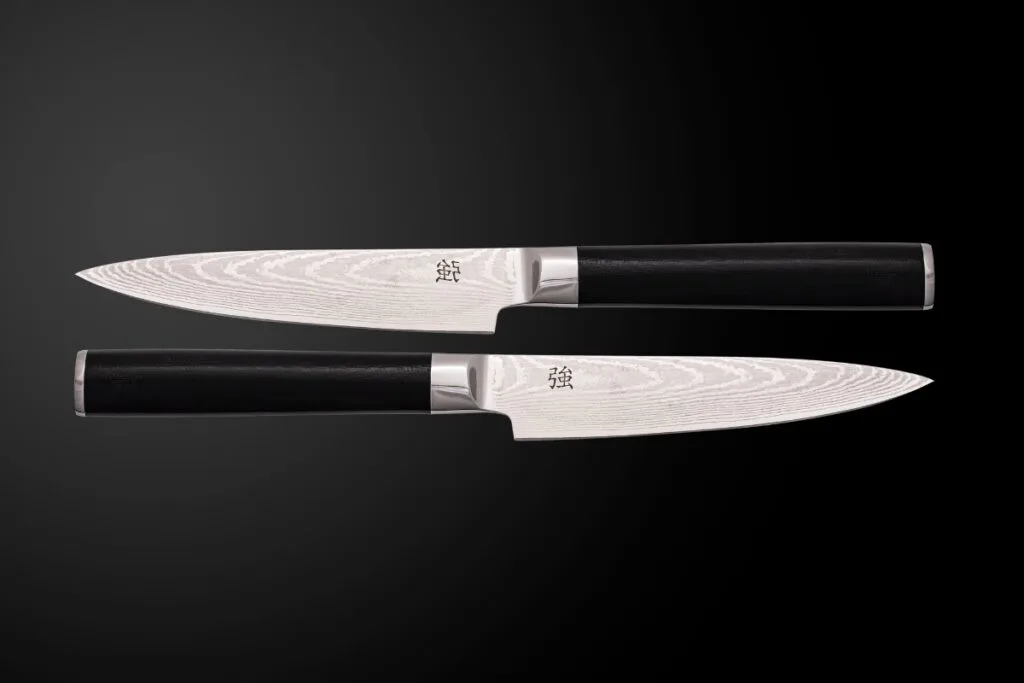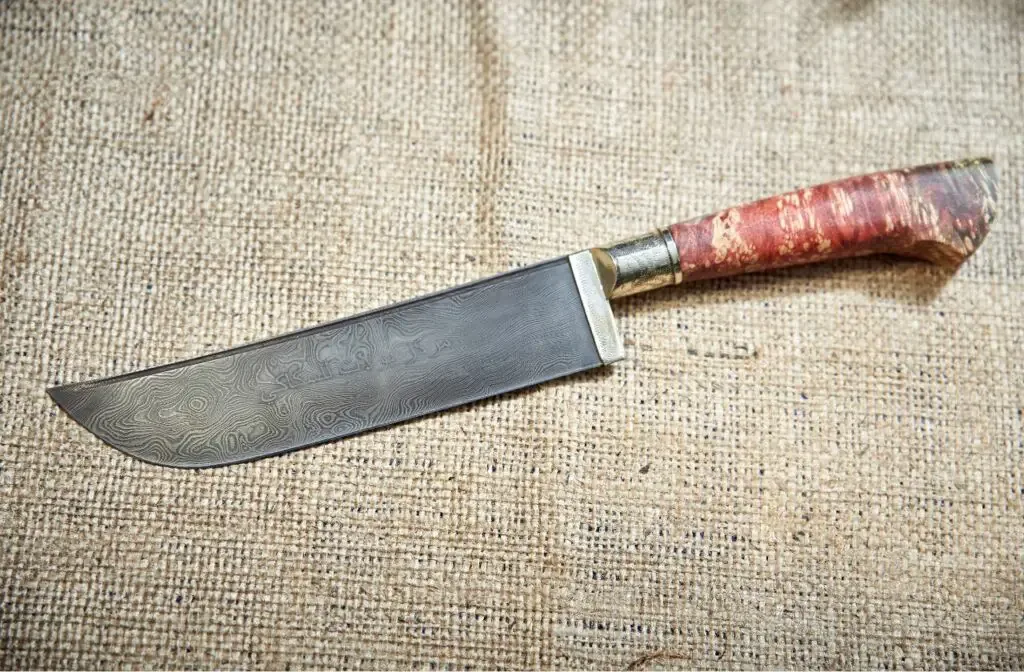As an Amazon Associate, we earn from qualifying purchases with no additional costs for you.
Damascus steel does not only look appealing, but it has sought-after properties that make high-quality, durable knives. How do you clean and take care of your Damascus steel knives? We have some pro tips to help you keep your Damascus knives in pristine condition.
Damascus steel knives must be oiled periodically to protect the high-carbon steel from rust. To clean a Damascus steel knife, wash it under warm water with a little dish soap and rub gently with a soft cloth or sponge. Never use an abrasive sponge, steel wool, or a pot scourer to clean the knife.
Damascus steel is complicated and time-consuming to make, which makes this type of steel expensive as a knife-making material. It is crucial to take care of your Damascus steel knives correctly to protect your investment in these quality blades!
If you are interested in checking out the best oil for taking care of Damascus steel knives, we recommend trying Yoshihiro TSOIL, made by the Yoshihiro company. You can find it by clicking here (Amazon link).

How To Care For A Damascus Knife
Damascus steel is popular for making various knives, from pocket and bushcraft knives to high-quality kitchen knives.
Damascus steel blades typically cost more than equivalent knives made from other types of steel. The type of steel used to create the Damascus will determine the care required to keep the knife blade in good condition.
Typically, Damascus steel is made of high-carbon steel, which is prone to oxidation and rust if the knife is not cared for correctly.
Incorrect cleaning and maintenance of the Damascus steel blade can result in rust, damaging the steel, or the etched pattern can wear away or disappear if the wrong methods are used to clean the knife.
Does Damascus Steel Need To Be Oiled?

Carbon steel Damascus blades are susceptible to moisture, and rusting can occur quickly. For this reason, it is wise to keep Damascus knives in a dry place and wash and dry them properly after use.
Knives used in a kitchen’s hot, humid conditions are particularly susceptible to rust and discoloration and should be oiled to protect the steel in this environment.
Processing acidic ingredients, such as citrus fruits, can also speed up oxidation and cause the knife to rust. Oiling the knife after processing these types of ingredients is of particular importance in the care and maintenance of the steel.
Field knives with Damascus steel blades can quickly oxidize when used for tasks where the blade is exposed to a wet, moist environment, such as field dressing an animal. After use, the knife should be cleaned and dried as soon as possible, removing all traces of blood and moisture from the steel.
Damascus knives should be cleaned by hand after each use, dried thoroughly, and oiled periodically. Regularly oiling the Damascus blade will prevent the high-carbon steel from developing rust, damaging the steel, and reducing the knife’s value and life.
You should regularly wipe a fine layer of oil over your Damascus steel knife blade to protect the steel from oxidation.
BTW: If you want to know more about Japanese and other knives and their sharpening, check out the books listed above. These books are recommended by professional sharpeners and knife makers (Amazon links):
- Japanese Kitchen Knives: Essential Techniques and Recipes
- The Knifenerd Guide to Japanese Knives
- Knife: The Culture, Craft, and Cult of the Cook’s Knife
- Sharp: The Definitive Introduction to Knives, Sharpening, and Cutting Techniques, with Recipes from Great Chefs
How Often Should You Oil A Damascus Knife?
The frequency of oiling a Damascus knife blade will be a personal choice and generally depends on your knife usage.
If you use your knife heavily and use your knives every day, you should lightly oil the blade whenever you have finished using the knife, and it has been washed and dried.
If you do not use your Damascus steel knife every day, it can still rust if not stored properly, even if you have not used it recently.
If you do not use your Damascus knife daily, you should oil the blade once a month, and after each time you have finished using the knife.
When oiling your Damascus knife, it is important to lightly coat all exposed parts of the steel, not only the knife’s blade. Pay close attention to the exposed steel on the bolster area, where the knife and handle meet, and the knife’s spine.
If the knife is a full tang knife, the steel may be visible between the two handle scales on either side of the metal tang. This exposed steel should also be treated with a light coating of oil to prevent rusting.
The choice of oil is important for protecting your Damascus steel knife. Not all oils are suitable for this purpose, and some can cause more problems for your knife.
TIP: Knife care and maintenance do not only involve honing and sharpening your knives but also how they are kept when not in use. Check out the best tips on storing kitchen knives in the article below:
Storing & Organizing Kitchen Knives: 5 Proven Tips & Hacks
Best Oil For Damascus Steel Knives
Oil is a great protective coat for a Damascus steel knife blade, but not all oils are suitable or provide sufficient protection to be a wise choice to coat the steel.
Many assume that vegetable and food oils are a good option to use on the knife blade because they are food-safe and readily available in the kitchen. However, most vegetable oils are some of the worst oils you can use on your Damascus steel knife.
Olive oil is a particular culprit that you should not use to oil the knife’s blade. The oil reacts with the air and becomes rancid on the blade, which creates acids that can damage the surface of the steel.
Not only does the rancid oil damage the steel, but it stinks and becomes tacky, allowing bacteria and other undesirable organisms to stick to it. The bacteria-ridden oil will not be a healthy option when using the knife for food preparation.
Vegetable oils, such as sunflower oil, also become rancid and sticky over time, but not as quickly as olive oil. For these reasons, we strongly suggest you do not use any food oils as a protective coating for your Damascus steel knives.
Motor oil or petroleum-based oils should not be used on knives that will be used to prepare food. These oils can transfer toxins to the food and affect the flavor of the ingredients.
Use Yoshihiro TSOIL On Your Damascus Steel Knife
One of the best types of oil you can use on your Damascus steel is an oil designed specifically for the maintenance and care of high-carbon steel blades.
Yoshihiro TSOIL (Amazon link) is the oil we recommend for use on high-carbon steel blades, including Damascus steel knives.
Yoshihiro Cutlery is a company that manufactures a wide range of quality Japanese kitchen knives, including Damascus steel knives (Amazon link). The company’s intimate knowledge of high-carbon steel gives them insight into the best way to protect their knife blades.
The oil is known in Japan as Tsubaki oil, is made from the Camellia japonica plant, and provides the perfect protective layer for carbon steel blades.
The oil is all-natural and food grade, giving you peace of mind for using it on your kitchen knives used to prepare food.
The knife oil comes with a rust eraser, which can be used to remove rust spots and patina from the blade but must be used with care on Damascus steel knives.
The rust eraser is a fine abrasive, which must be used with care, as it can rub off the intentional oxidation layer on the blade that reveals the Damascus pattern.
To use the Tsubaki knife oil, place a small drop on one flat face of the knife blade and use the supplied cloth to wipe a light, even layer of oil across the blade. Do not wipe all the oil off the knife. A thin layer must remain on the steel to prevent air from reaching the steel.
Place another drop of oil on the opposite face of the blade and spread the oil across the surface of the steel, ensuring that all exposed steel receives a layer of the oil.
Other Oils That Can Be Used On Damascus Steel Knives
Mineral oil is the only other oil we recommend for use on Damascus steel knives. The mineral oil you choose should be a food-grade-rated oil safe to use in the kitchen.
Mineral oils are often used as a food-safe method to treat wood or bamboo kitchen cutting boards to preserve the natural material.
A mineral oil we can recommend as a good alternative oil for your Damascus steel knives is the Thirteen Chefs food-grade mineral oil (Amazon link) that can be used on knives and cutting boards.
TIP: Bamboo and wooden cutting boards are popular with knife owners because they are knife-friendly and are made from natural products. Find out how to clean them properly in the article below:
4 Proven Methods: Cleaning Wooden & Bamboo Cutting Boards
How To Clean A Damascus Knife

Damascus blades are durable, but it is critical to use curtain precautions when cleaning and caring for them.
Abrasives such as rough cloths, metal polishes, steel wool, and kitchen scourers should be avoided. This is important for preserving the appearance and quality of the Damascus steel blade.
Using an abrasive material or metal cleaner will remove the desired etched oxidation on the knife steel to show the Damascus pattern.
The best method to clean a Damascus steel knife is to place a drop of dishwashing liquid on both faces of the blade and wash the blade under warm running water. You can lightly rub the blade under the running water with a soft cloth or your fingers as long as you are careful near the sharp cutting edge.
You should never clean your high-carbon Damascus steel knife by placing it in the dishwasher. The high water pressure, abrasive detergents, and other utensils in the dishwasher can damage the sharp edge, destroy the finish on the knife, and cause the knife to rust almost immediately.
Never leave your Damascus steel knife to soak in water or rest the blade on a wet cloth for a long period. These actions will promote rust development on the blade, which can damage the knife’s finish.
After washing the knife, the blade and handle must be dried thoroughly with a soft, dry, clean cloth to remove as much moisture from the steel as possible. Never pack your Damascus steel knife away while it is still wet. If you do this, the next time you take your knife out, it will have rust spots.
Once the knife has been dried, you can leave it in the open for an hour or so to air-dry to remove the final remnants of moisture before packing the knife in storage.
TIP: If you are interested in checking out the best Damascus steel knives, we recommend trying this amazing 2-piece set of Japanese knives made by the Yoshihiro company. You can find it by clicking here (Amazon link).
How To Clean Rust Off Damascus Knife
Your knife will inevitably develop a rust spot or two during the course of its life. It is important to address any rust spots as soon as possible to stop the progression of corrosion on the blade.
Rust spots left on the knife can eat into the upper layers of the steel, causing pitting, which will mar the knife’s surface, which will be visible after the rust is removed.
There are several simple methods for removing rust from a Damascus knife, all of which should be used with caution to prevent losing the Damascus pattern on the knife.
Most methods are a variation of the theme of using a very light abrasive with a mild acid. The method I recommend trying first is to slice a lemon in half and rub the sliced side of the lemon over the rust spot.
If the rust is not too established on the steel, the acidity of the lemon juice should remove the rust. The knife should then be washed thoroughly and oiled before being stored.
If the rust does not come off, add a little baking soda over the rust spot and rub it gently with the sliced lemon.
A similar method is to use a little baking soda with white vinegar, or preferably apple cider vinegar, which has lower acidity than white or spirit vinegar. Sprinkle the baking soda on the rust spot and add a drop of the vinegar. Use a soft cloth on the knife to rub the baking soda and vinegar mixture over the rust spot.
The baking soda has two functions: it acts as a light abrasive and lowers the acidity of the vinegar to reduce the vinegar, causing further rust problems.
The Damascus steel knife should always be washed properly, dried, and oiled after these rust removal operations to prevent the steel from rusting due to the acid in the lemon or vinegar.
TIP: Rust is a known problem on any knife in the kitchen, which requires maintenance and a prevention strategy. Check out the best-proven methods for preventing rust on knives in the article below:
6 Proven Ways On How To Prevent Rust On Kitchen Knives
How To Keep Damascus Steel From Rusting
The best way to keep your Damascus steel knife from rusting is to be pedantic about washing, drying, and oiling the knife after each use.
Proper storage is crucial to keep your knife rust-free if you do not use the knife daily. Do not store your Damascus knife in a leather sheath long-term. The leather absorbs moisture from the air, promoting the development of rust spots on the steel.
Tannins used to dye some leather products can be slightly acidic, promoting rust and damaging the finish on the knife.
Before placing a Damascus knife in a leather sheath, ensure it is clean and dry and give it a generous oil coating. Even with this treatment, a high-carbon steel knife should never be stored long-term in a leather sheath.
For long-term storage, remove the knife from the sheath, give it a coating of oil, wrap the blade in a kitchen paper towel, and store it next to the sheath.
BTW: If you are interested in buying the best cutting board, you can find our recommendations below:
- The best overall: Virginia Kitchen Boys Cutting Board (Amazon link). This fantastic cutting board is made from sustainable walnut wood from the United States and brings almost perfect safety when cutting with your knives.
- Alternative: Yoshihiro Cutting Board (Amazon link). Professional traditional Japanese cutting board that chefs around the world use.
- Cheaper option: Shun Cultery Cutting Board (Amazon link). Another Japanese cutting board stands out, especially for its simplicity and affordable price.
Mistakes To Avoid When Handling Damascus Steel Knives

Caring for Damascus steel knives involves more than just regular maintenance; it’s also about avoiding certain practices that can damage these exquisite blades.
Here are some common mistakes you should steer clear of to ensure your Damascus steel knives remain in top condition:
Avoid Using Dishwashers for Cleaning: Dishwashers can be detrimental to Damascus steel knives. The high water pressure, abrasive detergents, and the potential for clanging against other utensils can dull the blade, damage the finish, and promote rusting. Always opt for hand washing to preserve the integrity of your knife.
Proper Storage is Key: Storing Damascus steel knives in damp or poorly ventilated areas can lead to rust and corrosion. Leather sheaths, while aesthetically pleasing, can absorb moisture and harbor acids that may damage the blade if used for long-term storage. Instead, store your knives in a dry, ventilated area, ideally in a knife block or magnetic strip.
Regular Maintenance is Crucial: Neglecting regular oiling and cleaning can lead to rust and a dull blade. Ensure you oil and clean your knife after each use, especially if it has been exposed to acidic substances or moisture.
Use Appropriate Cleaning Tools: Avoid abrasive materials like steel wool or harsh chemicals for cleaning. These can scratch the blade and damage the unique Damascus pattern. Instead, use a soft cloth or a soft sponge with mild dish soap for cleaning.
Handle With Care: Mishandling can not only lead to accidents but also to the premature dulling of the blade. Always use proper cutting techniques and avoid using the knife as a tool for prying or chopping hard materials.
Avoid Extreme Environments: Damascus steel should not be exposed to highly acidic, alkaline, or salty environments for prolonged periods. These conditions can accelerate the corrosion process. Be mindful of this especially when cutting acidic foods like citrus fruits or tomatoes.
Sharpening Techniques Matter: Incorrect sharpening can irreparably damage your knife. Avoid using a sharpening angle that’s too steep or tools that are too abrasive. It’s often best to have your Damascus steel knives professionally sharpened or to use a sharpening stone designed for high-carbon steel.
Address Wear or Damage Immediately: If you notice any signs of wear, such as minor rust spots or dullness, address them immediately. Early intervention can prevent more serious damage and extend the life of your knife.
By avoiding these mistakes, you can maintain the beauty, sharpness, and longevity of your Damascus steel knives, ensuring they remain a valuable part of your kitchen or collection for years to come.
Conclusion
Damascus steel knives are made from high-carbon steel, which is prone to rust, with the added consideration of the pattern of the steel, which needs extra care to preserve the beauty and value of the knife.
Prevention is better than cure with Damascus steel knives, so ensure you take the precautions of cleaning, drying, and oiling the knife to minimize the development of rust. The rust or the measures to remove it can damage the pattern on the Damascus steel, which will require re-etching to restore the pattern.
TIP: There is no doubt that true Damascus steel has advantages for knives, but many suppliers fake a Damascus look on knives to drive up the price. Find out how to spot fake Damascus knives in the article below:
6 Main Differences: Real Vs. Fake Damascus Steel On A Knife

